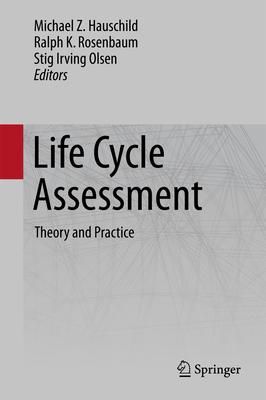Provides a comprehensive and pedagogic introduction to LCA methodology
Helps the reader understand the role of LCA in a future sustainable economy
Repository of LCA information covering a broad range of application fields
| 購物比價 | 找書網 | 找車網 |
| FindBook |
有 1 項符合
Life Cycle Assessment: Theory and Practice的圖書 |
 |
Life Cycle Assessment: Theory and Practice 作者:Hauschild 出版社:Springer 出版日期:2017-11-16 語言:英文 規格:精裝 / 1216頁 / 24.6 x 16.5 x 6.9 cm / 普通級 |
| 圖書館借閱 |
| 國家圖書館 | 全國圖書書目資訊網 | 國立公共資訊圖書館 | 電子書服務平台 | MetaCat 跨館整合查詢 |
| 臺北市立圖書館 | 新北市立圖書館 | 基隆市公共圖書館 | 桃園市立圖書館 | 新竹縣公共圖書館 |
| 苗栗縣立圖書館 | 臺中市立圖書館 | 彰化縣公共圖書館 | 南投縣文化局 | 雲林縣公共圖書館 |
| 嘉義縣圖書館 | 臺南市立圖書館 | 高雄市立圖書館 | 屏東縣公共圖書館 | 宜蘭縣公共圖書館 |
| 花蓮縣文化局 | 臺東縣文化處 |
|
|
Provides a comprehensive and pedagogic introduction to LCA methodology
Helps the reader understand the role of LCA in a future sustainable economy
Repository of LCA information covering a broad range of application fields
Dr. Michael Hauschild is professor in Life Cycle Assessment (LCA) of Environment and Resource Dimensions within Products and Systems. He is Head of the Division for Quantitative Sustainability Assessment at Technical University of Denmark, Department of Management Engineering. Michael Hauschild has 20 years of experience in environmental life cycle assessment of products and systems. He is co-receiver of the Nordic Council’s Great Nature and Environment Award 12 November 1997, co-receiver of the Danish part of the European Better Environment Awards for Industry, EBEAFI ’97, and in 2014 recipient of the Aase and Ejnar Danielsen Foundation’s environmental award of quarter of a million DKK. His pioneering work in LCA has helped to define the research area at Technical University of Denmark, which today is one of the international powerhouses for quantifying sustainability. According to the bibliometric investigation (Chen et al.: A bibliometric investigation of life cycle assessment research in the web of science databases. International Journal of LCA, DOI 10.1007/s11367-014-0777-3), Technical University of Denmark is the most cited university within the LCA discipline over the last 16 years.
Since 2014 Ralph K. Rosenbaum is the Director of the Industrial Chair for Environmental and Social Sustainability Assessment "ELSA-PACT" hosted by the French National Research Institute of Science and Technology for Environment and Agriculture (IRSTEA) in Montpellier, France. Passionate about quantitative environmental sustainability assessment including Life Cycle Assessment (LCA) since 1997, Ralph Rosenbaum is an expert in environmental modelling, LCA methodology development, and teaching related to sustainability and environmental assessment. He is co-author of the consensus model for the evaluation of comparative toxicity USEtox and the LCIA methods IMPACT 2002+ and Impact World+. He is subject editor of the International Journal of Life Cycle Assessment on the theme of impacts of chemicals on human health as well as vice-president and founding member of the International Life Cycle Academy based in Barcelona. Born in Germany, Ralph Rosenbaum finished his Environmental Engineering degree at the Technical University Berlin, Germany in 2003 and defended his Ph.D. thesis at the Swiss Federal Institute of Technology Lausanne (EPFL) in Switzerland in 2006. In early 2007 he joined the team of CIRAIG at the École Polytechnique de Montreal, Canada as researcher and lecturer and was then appointed Associate Professor at the Technical University of Denmark (DTU) in Copenhagen in 2010.
Dr. Stig Irving Olsen is Associate Professor in sustainable production at Division for Quantitative Sustainability Assessment at Technical University of Denmark, Department of Management Engineering. He has been working with environmental research for more than 25 years and became involved with Life Cycle Assessment (LCA) research in 1993. His research interests and achievements varies from methodology development in LCA, particularly in the life cycle impact assessment of human health impact, to the application of LCA for decision support regarding sustainable production in industry as well as the combination of risk assessment and LCA. The use of LCA for technology assessment in emerging technologies, especially nanotechnology has been a major research field. As an educational scholar he is also concerned with education of engineering students in sustainability.
|